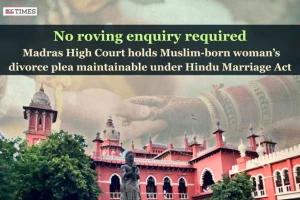Madras High Court: In a petition filed under Section 13(B) of the Hindu Marriage Act, 1955 (‘the Act’) seeking dissolution of marriage by mutual consent, where the marriage had been solemnized in a Hindu temple according to Hindu rites and customs, a Single Judge Bench of P.B. Balaji, J., held the petition maintainable. The Court emphasised that although the wife was a Muslim by birth, her conduct clearly demonstrated conversion to Hindu faith, and the mere absence of a formal ceremony could not justify dismissal of the application. The Court observed that her participation in the marriage solemnization in accordance with Hindu rites and customs, together with approaching the Family Court under the provisions of the Act, sufficiently established conversion.
Background facts:
The couple had solemnized their marriage at a Hindu temple in Chennai in accordance with Hindu customs and rites. They later filed a petition for divorce by mutual consent under Section 13(B) of the Act before the Sub Court at Ambattur. The Sub Court questioned the maintainability of the petition since the wife was a Muslim by birth and dismissed the petition relying on Section 2 of the Act.
The couple contended that although the wife was born a Muslim, she had married in accordance with Hindu customs and rites, and the marriage was solemnized in a Hindu temple. It was argued that she never claimed to be a Muslim at the time of marriage, but professed Hinduism.
It was further submitted that her maternal grandmother was Hindu, she was brought up as per Hindu customs, and her conduct clearly demonstrated conversion to Hinduism. Reliance was placed on marriage photographs and a letter issued by the temple trust confirming the solemnization of the marriage.
Analysis and Decision:
The Court observed that there was no necessity for the Court to conduct any roving enquiry in such circumstances, merely because the wife’s name continues to be her original Muslim name. The Court noted that as held by the Supreme Court in Perumal Nadar v. Ponnuswami, (1970) 1 SCC 605, there is no necessity for a person professing a particular religion to claim conversion to another religion by any formal ceremony or even declaration as mere conduct would suffice to establish conversion.
The Court highlighted that in the present case, by express conduct in participating in the marriage solemnization in accordance with Hindu rites and customs and by approaching the Family Court invoking the provisions of the Act, the wife was showing conversion to the Hindu faith. The Court further noted that the couple were decided to amicably part ways and were presenting the petition for grant of a decree for dissolution of marriage by mutual consent.
The Court emphasised that there was no objection by the Registry or by the Court when the application was filed invoking Section 13(B) of the Act. The Court observed that the couple, having solemnized their marriage in a Hindu Temple and in accordance with Hindu rites and customs, will also not be in a position to seek divorce under the Special Marriage Act. Consequently, the Court held that the only remedy for the couple is to seek dissolution of the marriage by invoking the provisions of the Act.
In conclusion, the Court noted that though the wife was a Muslim by birth, conversion to the Hindu faith was clearly demonstrated by her conduct, and the mere absence of any ceremony could not be a ground to dismiss the application for divorce by mutual consent.
Therefore, the petition under Section 13(B) of the Act was maintainable. The order of the Subordinate Judge was set aside, and the matter was remitted to the Sub Court to decide the petition on merits within four weeks.
[K. Krishnapriyan v. Aayisha Siddiqua, 2025 SCC OnLine Mad 10181, 07-11-2025]
Advocates who appeared in this case:
For the Petitioners: V. M. Venkataramana

